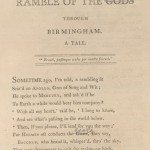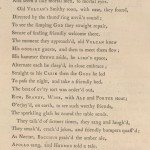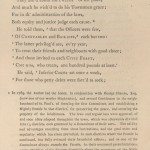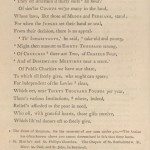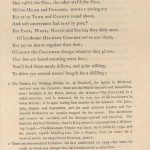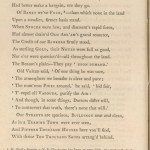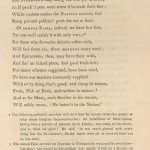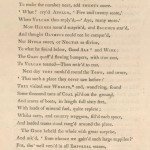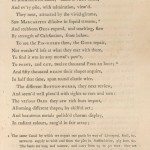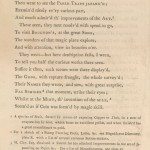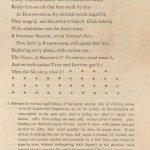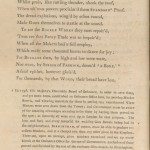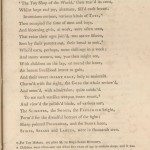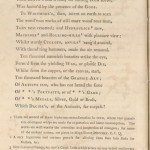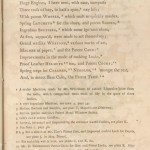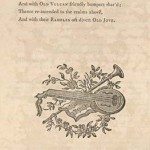A Ramble of the Gods Through Birmingham by J. Bisset
From: Bisset’s Magnificent Directory
RAMBLE OF THE GODS
THROUGH
BIRMINGHAM.
A TALE.
“Eranti, paffimque oculos per cunєla fermti.”
Sometime ago, I’m told, a rambling fit
Seiz’d on APPOLLO, GOD of Song and Wit;
He spoke to MERCURY, and ask’d if he
To Earth a while would bear him company?
‘With all my heart,’ said he, ‘I long to know,
‘And see what’s passing in the world below.
‘Then, if you please, I’ll lead for you the way;
For HERMES oft conducts the GODS, they say.
BACCHUS, who heard it, whisper’d, thro’ the sky,
That soon they meant to quit the realms on high,
Propos’d that their example he might follow,
Which was with joy accepted by APPOLLO.
They went, and leave of absence ask’d of JOVE,
Then sallied gaily forth from REALMS ABOVE.
To BRITAIN’S ISLE, with speed, they bent their flight,
And lighted HERE, 1 just on the edge of night;
IMMORTAL forms they veil’d in dark disguise,
And seem’d like mortal men, to mortal eyes.
Old VULCAN’s Smithy soon, with ease, they found,
Directed by the thund’ring anvil’s sound;
To see the limping GOD they straight repair,
Secure of finding friendly welcome there.
The moment they approach’d, old VULCAN knew
His GODLIKE guests, and then to meet them flew;
His hammer thrown aside, he LIMP’D apace,
Alternate each he clasp’d, in close embrace;
Straight to his CABIN then the GODS he led
To pass the night, and take a friendly bed.
The best of ev’ry sort was order’d out,
RUM, BRANDY, WINE, with ALE and PORTER stout;
O’erjoyed, on earth, to see such worthy friends,
The sparkling glass he round the table sends.
They talk’d of former times, they sang and laugh’d,
They smok’d, crack’d jokes, and friendly bumpers quaff’d;
As Nectar, BACCHUS prais’d the amber ale,
APPOLLO sang, and HERMES told a tale.
The HOST well pleas’d, the guests quite blithe and gay,
In mirth and glee the ev’ning pass’d away.
The GODS now told their errand – VULCAN smil’d –
With various anecdotes the time beguil’d;
1 In Birmingham
And ‘vow’d, next day, if they would walk at leisure,
‘That he’d be happy to attend their pleasure.’
They ask’d about the POLICE1 of the place,
And much he wish’d to do his Townsmen grace;
For in th’ administration of the laws,
Both equity and justice judge each cause.2
He told them, ‘that the Officers were few,
‘Of CONSTABLES and BAILIFFS,3 each but two:
‘The latter privileg’d are, ev’ry year,
‘To treat their friends and neighbours with good cheer;
‘And those invited to each CIVIC FEAST,
‘Cost HIM, who treats, one hundred pounds at least.’
He said, ‘Inferior Courts sat once a week,
‘For those who petty debts were forc’d to seek;
1 In 1789, the Author had the honour, in conjunction with George Simcox, Esq. (now one of our worthy Magistrates) and several Gentlemen in the neighbourhood of St. Paul’s, of forming the first Committee, and establishing a Nightly Patrol in that district, for preserving the peace, and securing the property of the inhabitants. The laws and regulations were approved of and soon after adopted throughout the town, which was afterwards divided into 13 districts, each governed by a Committee of their own. The utility and advantages resulting from these Institutions, and the good order and regularity which has since prevailed, in such districts where the Patrole is continued, has fully evinced their beneficial effects; and as one of the Committee always attends the Patrole, in their nocturnal perambulations, every Member of the Society cheerfully obeys the summons of the Night Constable, whenever it comes to his turn.
2 Our Magistrates, much to their honor, sit at the Public Office a few hours every day for the despatch of business.
3 The High and Low Bailiffs, two Constables, and a Headborough, are chosen annually from the most respectable inhabitants of the town.
*** No salary or emolument is annex’d to the offices in Birmingham!
‘Procrastination there, is seldom known,
‘The Judges soon award each one his own.’
And, tho’ they seem’d to wonder, VULCAN swore,
‘They oft determin’d thirty suits1 an hour.’
Of sim’lar COURTS we’ve many in the land,
Whose laws, like those of MEDES and PERSIANS, stand;
For when the JUDGES set their hand or seal,
From their decision, there is no appeal.
‘Th’ INHABITANTS,’ he said, ‘take old and young,
‘Might then amount to EIGHTY THOUSAND strong.
‘Of CHURCHES2 there are Two, of CHAPELS Four,
‘And of DISSENTING MEETINGS near a score.’
Of Public Charities we have our share,
To which all freely give, who ought can spare;
For independent of the Levies3 clear,
Which net, near THIRTY THOUSAND POUNDS per year,
There’s various Institutions,4 where, indeed,
Relief’s afforded to the poor in need,
Who oft, with grateful hearts, those gifts receive,
Which lib’ral donors oft so freely give.
1 The Court of Requests, for the recovery of any sum under 40s. – The Author has often known above 100 causes determined in less than three hours.
2 St. Martin’s and St. Philip’s Churches. The Chapels of St Bartholomew, St. Mary, St. Paul and St. John, in Deritend.
3 Levies for the Poor are collected about eighteen times per annum, at the rate of 6d. in the pound each levy, on all houses above six pounds.
4 The General Hospital, the Dispensary, the Blue Coat Charity School, and one belonging to the Dissenting Meetings, all supported by Voluntary Contributions; also the Benevolent Society, and Subscriptions for Bread, Coals, Soup, &c. which are distributed amongst the lower order of the people, every week, during the winter.
Of Public PLACES for AMUSEMENT, we
Can boast of little more than TWO or THREE:1
Of LIBRARIES rare,2 we number two,
One called the OLD, the other styl’d the NEW.
We’ve MAILS and COACHES, HOURLY setting out
For ev’ry TOWN and COUNTY round about,
And safe conveyance had to ev’ry part,3
For EAST, WEST, NORTH and SOUTH, they daily start.
Of handsome HACKNEY COACHES we’ve our share,
But yet no Act to regulate their fare;
Of course the COACHMEN charge what e’er they please,
Tho’ few are found extorting extra fees;
You’ll find them steady fellows, and quite willing,
To drive you several streets’ length for a shilling;
1 The Theatre, the Bowling Greens, &c. at Vauxhall, the Appollo in Deritend, and one near the Crescent; there are also Public Concerts and Assemblies, every fortnight at the Hotel, during the winter. – The THEATRE is a noble structure, and is reckoned, for its size, one of the handsomest in Great Britain: it is open during four months in the summer, viz. June, July, August, and September, and the most eminent London and Provincial Performers are usually engaged for the season. The machinery and scenery are excellent, and the Manager spirited and attentive. We formerly had two Theatres; that in King-street is converted into a Dissenting Chapel. – The New-street Theatre was burnt by accident in 1792, and the present superb building rose, like a Phoenix, from its ashes: for a view of which see Magnificent Directory, plate C.
2 There are two excellent Libraries, the first established in 1779 – the latter in 1796, to which any stranger may be introduced by a subscriber.
3 London Coaches start, daily, from the Castle, the Dog, The George, Saracen’s Head, the Rose and Swan Inns, &c. and Mails every day from some of the above, for Bristol, Shrewsbury, Liverpool, Manchester, Sheffield, Nottingham, &c. The London Mail sets off every afternoon, from the Dog Inn, exactly at three o’clock, and the Bristol, at five, from the Castle.
TWO SHILLINGS to VAUXHALL’s their usual fare,
Or EIGHTEEN-PENCE the CRESCENT or the SQUARE;1
But those who visit HANDSWORTH2 or SOHO,
Had better make a bargain, ere they go.
Of BANKS we’ve FOUR,3 – than which none in the land
Upon a steadier, firmer basis stand.
When STOCKS were low, and discount’s rapid force,
Had almost drain’d OLD ABR’AM’S grand resource,
The Credit of our BANKERS firmly stood,
As sterling GOLD, their NOTES were full as good,
Nor e’er were question’d – all throughout the land.
The Reason’s plain – They pay ‘UPON DEMAND’.
Old Vulcan said, ‘Of one thing he was sure,
‘The atmosphere we breathe is clear and pure;
‘The num’rous FIRES around,’ he said, ‘bid fair,
‘T’ expel all VAPOURS, purify the AIR:
‘And though, in some things, Doctors differ still,
‘To controvert that truth, there’s none that will.’
Our STREETS are spacious, BUILDINGS neat and clean,
As in a TRADING TOWN were ever seen,
And FIFTEEN THOUSAND HOUSES here you’ll find,
With thrice TEN THOUSAND SHOPS arrang’d behind.
1 St. Paul’s Square – N.B. Since corn has been so very high, the Author finds the Fares have been advanced to 2s.
2 A very handsome village about half a mile beyond SOHO, surrounded by Gentlemen’s seats.
3 Three of the Banks have honoured the Author with their Firms for his Magnificent Directory. See plate A.
The STREETS are pav’d, ‘tis true, but all the stones
Are set the wrong way up, in shapes of cones,
And STRANGERS limp along the best pav’d street,
As if parch’d peas were strew’d beneath their feet;
Whilst custom makes the NATIVES scarcely feel
Sharp pointed pebbles1 press the toe or heel.
Of ANNUAL FAIRS, indeed, we have but few,
Yet rest well satisfy’d with only TWO;2
But those who favourite dainties often seek,
Will find there are, three MARKETS every week;
And Epicureans, then, may have their wish,
And tho’ an inland place, find good fresh fish;
For many schemes suggested, have been tried,
To have our markets constantly supplied
With ev’ry thing that’s good, and cheap in reason,
Fruit, Fish or Fowl, and rarities in season:3
And as for Meat, each Butcher in his station,
Will safely swear, ‘No better’s in the Nation.’
1 The following authentic anecdote will shew how far custom reconciles people, to what others imagine inconveniences: An inhabitant of Birmingham, having been a journey of pleasure up to London, was asked, on his return, how he liked the place? He said, ‘he was much pleased with every thing but the PAVEMENT, for the stones were all so SMOOTH there was no foot-hold.’
2 The annual Fairs are held the Thursday in Whitsuntide week and the two following days: the second on Michaelmas day, unless it falls on a Sunday, in which case it is held on the Monday and two following days. The latter is a very great Onion Fair; and in 1778, the toll was paid for 84 waggon-loads.
3Our Markets every week are well supplied: fruit of all kinds, and excellent vegetables, are brought from the adjacent counties. Fine Severn salmon from the West, and all kind of fish from E, N, & S. coasts, &c.
Of INNS and PUBLIC HOUSES there are plenty,
To guess at which you’ll double TEN times TWENTY:
When that is done, you then may take FOUR SCORE,
To make the number near, add TWENTY more.
‘What!’ cry’d APPOLLO, ‘Five and twenty score,’
When VULCAN thus reply’d, – ‘Aye, many more.’
Now HERMES seem’d surpris’d, and BACCHUS star’d,
And thought OLYMPUS could not be compar’d,
Nor HYBLA sweet, or NECTAR so divine,
To what he found below, GOOD ALE1 and WINE:
The GODS quaff’d flowing bumpers, with true zest,
To VULCAN toasted – Then retir’d to rest.
Next day THEY rambl’d round the TOWN, and swore,
‘That such a place never saw before:’
THEY visited our WHARFS,2 and, wond’ring, found
Some thousand tons of COAL pil’d on the ground,
And scores of boats, in length full sixty feet,
With loads of mineral fuel, quite replete;
Whilst carts, and country wagons, fill’d each space,
And loaded teams stood rang’d around the place.
The GODS behold the whole with great surprise,
And ask’d, ‘from whence we gain’d such large supplies?’
For, tho’ well vers’d in all EMPYREAL scenes,
THEY here were pos’d, to find our ‘Ways and Means,’ –
1 Birmingham is famed for fine ale.
2 For Navigation Office and coal Wharf, see letter y, in the Plan of Birmingham. It is a very neat building, and weighing machines are under each gateway.
When satisfy’d1 – then told, some hundred ton
Would be consum’d that day, ere setting sun,
In BIRMINGHAM alone, – amaz’d THEY stood,
And ev’ry pile, with admiration, view’d.
They next, attracted by the vivid gleams,
Saw MARCASITES dissolve in liquid streams,2
And stubborn ORES expand, and smelting, flow
By strength of Calefaction, from below.
To see the PIN-WORKS then, the GODS repair,
Nor wonder’d less at what they met with there,
To find it was in any mortal’s pow’r,
To POINT, and CUT, twelve thousand PINS an hour;3
And fifty thousand HEADS their shapes acquire,
In half that time, spun round elastic wire.
The different BUTTON-WORKS, they next review,
And seem’d well pleas’d with sights so rare and new;
The various ORES they saw rich hues impart,
Assuming different shapes, by skilful art;
And beauteous metals polish’d charms display,
In radiant colours, rang’d in fair array;
1 The same Canal by which we export our goods by way of Liverpool, Hull, &c. serves to supply us with coal from the pits in Staffordshire, pig Iron, &c. The boats are long and narrow, and carry from 25 to 50 tons: they are drawn by a single horse, and go at the rate of about two miles an hour.
2 At Dearman and Francis’s Eagle Cast Iron Foundry, Broad-street. Their newly invented Culinary Utensils, bid fair to rival every thing of the kind hitherto manufactured in cast iron. For a view of the works, see plate U.
3The Author went to Mr. Phipson’s Manufactory, to ascertain how many pin heads could be spun in a short space of time; when he saw a boy, about twelve years of age, form 7200, in three minutes.
The process of the GILDING look’d well o’er,
Yet scarce could tell RICH GILT, from SEMILORE;1
Each STAMP, each LATHE, and PRESS2 THEY careful scann’d,
Then went to see the PAPER TRAYS JAPANN’D;
Examin’d nicely ev’ry curious part,
And much admir’d th’ improvements of the ART.3
These seen, they next resolv’d with speed to go,
To visit BOULTON’S, at the great SOHO,
The wonders of that magic place explore,
And with attention, view its beauties o’er.
They went – but here description fails, I ween,
To tell you half the curious works there seen.
Suffice it then, such scenes were display’d,
The GODS, with rapture fraught, the whole survey’d;
Their NAMES they wrote, and saw, with great surprise,
FAC SIMILES4 that moment, strike their eyes;
Whilst at the MINT, th’ invention of the MILL,5
Seem’d as if Coin was form’d by magic skill.
1 A species of Brass, form’d by mean s of exposing Copper to Zinc, in a state of evaporation by heat, which bears an excellent polish, and when finish’d has a great resemblance to gold.
2 For a sketch of a Stamp Piercing Press, Lathe, &c. see Magnificent Directory, plate R, with a list of several eminent Button-makers.
3 H. Clay, Esq. obtained a Patent for his admired improvements in the art of Japanning on Paper, &c. For a list of Manufacturers, see plate O.
4 From Watt and Company’s Patent Copying Machine.
5 The Coining Mill has been much improved since it was first erected, in 1788; it is adapted to work eight machines, and each is capable of striking from seventy to eighty-four pieces per minute, the size of a guinea; which is equal to between 30,000 and 40,000 per hour; and at the same time blow, which strikes the face and reverse, the edge of the piece is also struck either plain or with an inscription. See elegant Coins now in circulation.
But when the ponderous ENGINES1 were survey’d –
THEY ev’ry tribute due to merit paid:
Then, with reluctance, forc’d themselves away,
Resolv’d to see all that they could by day.
At HANDSWORTH, by intrinsic worth impell’d
They stopp’d, and EGINTON’S Stain’d Glass beheld,
With admiration saw the Artist trace,
A beauteous SERAPH, or an ANGEL’S face.
Now back to BIRMINGHAM , with speed they hie,
Exploring ev’ry place, with curious eye.
The GODS, at SWINNEY’S2 FOUNDARY, stood amaz’d,
And on each curious TYPE and LETTER gaz’d;
Then the MUSEUM view’d! * * * *
1 Amongst the various applications of the steam engine, that of Coining seems to be of considerable importance, as, by its power, all the operations are concentred on the same spot; such as rolling the cakes of copper into sheets. 2ndly. Fine rolling the same cold, in steel polish’d rollers. 3rdly. Cutting out the blank pieces of coin, which is done with greater ease and facility by girls, than could possibly be done by strong men. It is also assists in shaking the coin in bags, and works a number of coining machines with greater rapidity and exactness, by a few boys, than could be done by men, without endangering their fingers; as the machine itself lays the blank upon the die, perfectly concentral with it, and, when struck, displaces one piece and replaces another. See Shaw’s Hist. of Staffordshire.
2 This useful Branch of the Typographic Art, immediately on the demise of the late celebrated Baskerville, was resumed, and is now continued, with persevering industry and success, by Mr Swinney, whose elegant Specimens of Printing, add celebrity to the other manufactures of this Emporium of the Arts.
Next, at the GUN WORKS, THEY, surpris’d, beheld
The lusty Cyclops musket barrels weld;
Whilst peals, like rattling thunder, shook the roof,
When nit’rous powers proclaim’d them STANDARD1 Proof.
The dread explosions, wing’d by echoes round,
Made GODS themselves to startle at the sound.
To see the BUCKLE WORKS they next repair’d,
‘T’was ere that Fancy Trade was so impair’d;
When all the Makers had a full employ,
Which made some thousand hearts to dance for joy;
For BUCKLES then, by high and low ere wore,
Nor were, by SPRIGS of FASHION, deem’d ‘a BORE’2
A fatal epithet, however, gloss’d
For thousands, by that WORD, their bread have lost.
1 In 1796, His Majesty’s Honorable Board of Ordnance, in order to save time, and get more Arms, established an Ordnance Office here, for proving Musket Barrels, and viewing materials for them in setting up; experienced View Masters were sent down from the Tower; and Government must be aware of the amazing advantages to the State by having them proved on the spot; as formerly all were sent up to London for that purpose. The iron and fuel, and every material for welding Gun Barrels being held in the neighbourhood, BIRMINGHAM, of course, must be able to produce excellent Muskets, and at a cheaper rate than any other place in the kingdom. There are, upon an average, 4200 muskets examined and set up every Month at the Ordnance Office for the use of Government, exclusive of those proved and finished by the rest of the eminent Gun-makers in Birmingham, for home consumption and for exportation. See plate E, Magnificent Directory, for those Gentlemen who sent their Names for insertion.
2 BORE, is a SUBLIME epithet, used by the more enlightened EPHEMERALS of the animal creation, to express any thing UNFASHIONABLE, in contra-distinction to the superlative TIPPY, which signifies all that is elegant and in the TON. Sic transit Gloria Mundi!
Ingenious engines prov’d mechanic pow’rs
And happy pass’d the months, weeks, days and hours;
‘The Toy Shop of the World,’ then rear’d its crest,
Whilst hope and joy, alternate, fill’d breast.
Inventions curious, various kind of TOYS,1
Then occupied the time of men and boys,
And blooming girls, at work, were often seen,
That twice their ages join’d, was scarce fifteen,
Sent by their parents out, their bread to seek,2
Who’d earn, perhaps, some shillings in a week;
And many women too, you then might see,
With children on the lap, or round the knee,
An honest livelihood intent to gain,
And their sweet INFANT RACE, help to maintain.
Charm’d with the sight, the GODS the whole review’d,
And seem’d, with admiration, quite subdu’d.
To see each warlike weapon THEY resort,3
And view’d the polish’d blade, of various sort,
The SCIMETER, the SWORD, the FAULCHION bright,
Form’d for the dreadful horrors of the fight;
Sharp pointed POIGNARDS, and the SABRE keen,
SPIKES, SPEARS and LANCES, were in thousands seen.
1 For Toy Makers, see plate M, in Magnificent Directory.
2 Children were often sent out when five years of age to various shops, and it was a melancholy circumstance to reflect, that the means for their education were thus neglected; but by the salutary establishment of the Sunday Schools, some thousands now have an opportunity of learning both to read ands write; while every attention is paid to their morals.
3 For a list of eminent Sword Cutlers, &c. see plate K, in Magnificent Directory.
From thence THEY went, well satisfy’d away,
To see the WHIP1 ingenious engines play;
Then LLOYD’S fam’d mill, for slitting IRON RODS,2
Was honor’d by the presence of the GODS.
To WHITMORE’S, then, intent on earth to scan
The wond’rous works of still more wond’rous man,
THEY next resorted; and HYDRAULICS3 new,
MACHINES4 and ROLLING-MILLS 5 with pleasure view;
Whilst sturdy CYCLOPS, ANVILS6 rang’d around,
With thund’ring hammers, made the air resound.
Ten thousand nameless beauties strike the eye,
Form’d from the yielding WAX, or plastic DIE,
Whilst from the copper, or the canvas, start,
Then thousand beauties of the GRAPHIC ART;
Of Artists rare, who has not heard the fame
Of * * ‘s PORTRAITS, or of * * ‘s GAME;
Of * * ‘s MEDALS, Silver, Gold or Brass,
Which DACIER’S, or the Antients, far surpass!
1 There are several of these ingenious manufactories in town, where vast quantities of elegant whips are made for exportation and home consumption. The works are well worthy the attention and inspection of strangers; for some of the makers’ names, see plates in Magnificent Directory. C, I, Q.
2 A very ingenious and curious process for slitting Iron Bars into Rods for Nailors, &c.
3 New invented Pumps, &c. and a Canal Lock which raises up one vessel and lowers another without loss of water.
4 Machines upon a new construction for weighing barges, boats and wagons, &c. and Patent Machines for Mashing Malt without manual labour.
5 For a sketch of a rolling or flatting mill, see Mr Whitmore’s card in Magnificent Directory, Plate U.
6 For Anvil, Vice, Hammer and Scale Beam Makers, &c. see plate L.
From Articles minute, to pond’rous ORES,
The ROYAL PATENT, here, is found in scores;
Huge Engines, I have seen, with ease, compress
Three truss of hay, in half a span,1 nay less;
With patent WHEELS,2 which malt so quickly mashes,
Spring LATCHETS3 for the shoes, and patent SASHES,4
Ingenious SNUFFERS,5 which some ign’rant elves,
At first, suppos’d, were made to act themselves;
Grand warlike WEAPONS,6 various works of art,
MACHEE of paper,7 and the Patent CART:8
Improvements in the mode of making Locks,9
Proof Leather HELMETS10 too, and Patent COCKS;11
Spring steps for COACHES,12 NEEDLES,13, ‘mongst the rest,
And, to detect Base Coin, the Patent TEST,14
1 A massy Machine, made by Mr Whitmore, to extract Liquorice juice from the roots, which compressed three truss of hay in the space of three inches.
2 A very ingenious Machine, see note 4, page 34.
3 Messrs. Boulton and Smith’s, see plate T, Magnificent Directory.
4 Messrs. Jordan and Co’s Patent Metal Window Sashes.
5 Gill’s SELF acting Snuffers.
6Several, invented and improved by the eminent Sword Cutlers, see plate K.
7 See Note 2, page 30.
8 & 9 For a sketch of Mr Clay’s Patent Cart, and improved double Lock for Canals, see plate J, in Mag. Direct.
10 For resisting wet or heat, see plates C, and K, do.
11 Mr E. Thomason’s Patent Cocks for Gun and Pistol Locks, see plate X, Magnificent Directory. Also, a view of his Manufactory.
12 Ditto Steps for Carriages, which raise up and let down by the opening and shutting of the Carriage Door, see plate do.
13 Sheward’s —-.
14<sup> A Liquid, invented by the ingenious Mr Alston, for detecting base silver.
The GODS, well pleas’d, with all THEY saw on Earth,
Where works of genius daily had New Birth,
Breath’d forth a pray’r that soon a lasting Peace,
Might crown this Isle, and Commerce still increase;
Then to their lib’ral Host’s, THEY back repair’d,
And with OLD VULCAN friendly bumpers shar’d;
Thence re-ascended to the realms above,
And with their RAMBLES oft divert OLD JOVE.



